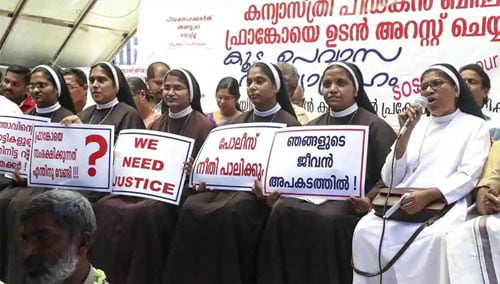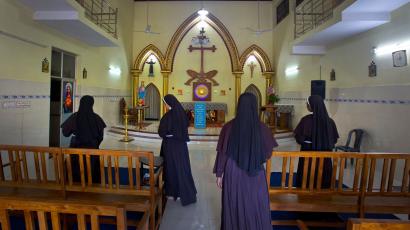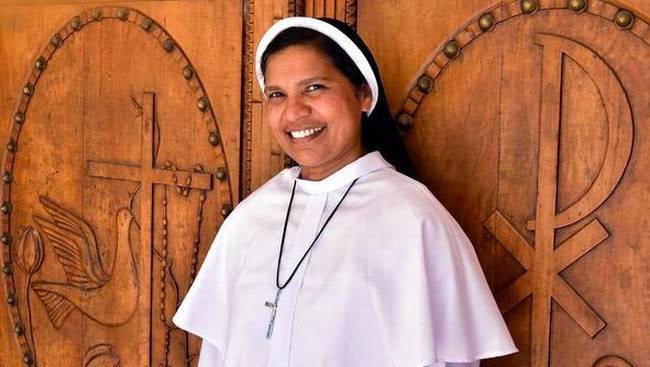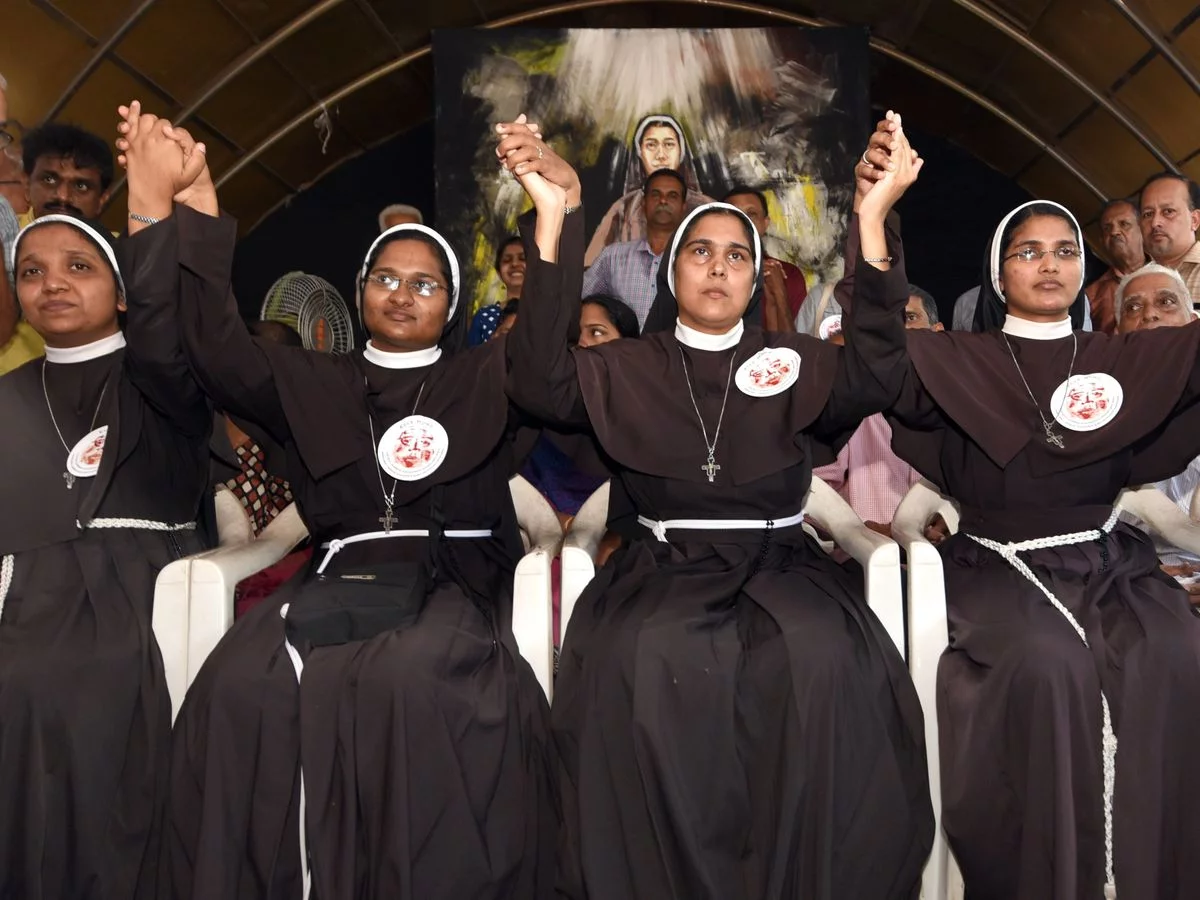Sister Lucy Kalappura, one of the Kerala nuns who protested against the rape-accused bishop Franco Mulakkal last year, was expelled from the Franciscan Clarist Congregation (FCC), for her lifestyle which stood in violation with the church norms.
The dismissal from the congregation was in response to Sister Lucy’s inability to give a “satisfactory explanation” for buying a car, acquiring a driving licence and publishing poems. The decision was taken on 11 May 2019 in the General Council where there was a unanimous voting for Sister Lucy’s dismissal from the FCC.
The decree issued, received the confirmation from the Congregation for the Oriental Churches in the Vatican. An excerpt from the confirmation letter of Vatican read, “The Congregation for the Oriental Churches, by virtue of the faculty given to it by the Supreme Pontiff Pope Francis having considered everything seriously, has granted the confirmation, as per the request, so that the same professed one remains freed from her religious profession and other obligations and separated from her Religious Congregation, and to be considered dismissed from her religious life, and to be considered as a simple layperson the other things to be done what are to be done according to the law.”
The dismissal from the congregation was in response to Sister Lucy’s inability to give a “satisfactory explanation” for buying a car, acquiring a driving licence and publishing poems.
Sister Lucy has been given a deadline of 10 days to make recourse to the congregation against this decree of dismissal. In response to the dismissal, she told the media, “There is no fault on my part. I will not move out from the convent and I will fight against this (dismissal) legally.“
Prior to this letter, the Kerala nun had received two letters warning her for her “lifestyle” and for joining the protests against the rape-accused Franco Mulakkal. She contends that she did not violate any rules; instead the congregation was violating her rights. It is noteworthy to recall that after Sister Lucy joined the protests led by five nuns of Missionaries of Jesus in September 2018, the church banned her from teaching the Bible and attending prayers, worship services and other activities of the parish, including offering holy communion.
In September 2018, Bishop Mulakkal, a senior member of the Roman Catholic clergy in India, was arrested after a nun alleged that he had repeatedly raped and sexually assaulted her at the Kuravilangad convent between 2014 and 2016. Mulakkal denied these charges and had previously filed a case of blackmail by relatives of the nun. Two months later, Mulakkal was released on bail and was “temporarily” relieved of all pastoral responsibilities as the bishop of the Jalandhar diocese by the Vatican.
Isolation of the Nuns

Earlier this year, four of the five nuns who supported their fellow rape survivor nun—Sister Alphy Pallasseril, Sister Anupama Kelamangalathuveliyil, Sister Josephine Villoonnickal, and Sister Ancitta Urumbil—had been asked to leave the Kuravilanagd convent. In the letters accessed by TNM showed the Superior General Regina Kadamthottu as he wrote,
“Accusations sans truth have been flying thick and fast in the public realm about the lack of concern the MJ Congregation was showing to the nuns who are standing for justice. Even as you and a few other MJ members continue to have no qualms in issuing malafide public statements and circulate baseless stories tarnishing the images of the MJ congregation and portraying the Mother General and other members as “enemies of those who are fighting for their justice,” I have been ensuring that the congregation continue supporting you all with food, accommodation and the cost of medical treatment as required.“
The four nuns had been ordered to leave for the convents they were previously assigned by the Missionary of Jesus. This was seen as an attempt at weakening their collective strength as they stood in solidarity with their fellow rape-survivor. The fifth nun, Sister Nina Rose, who was a part of the protest, was not asked to leave.
Prior to this letter, the Kerala nun had received two letters warning her for her “lifestyle” and for joining the protests against the rape-accused Franco Mulakkal.
The four nuns wrote to Kerala’s chief minister. In their letter to the chief minister, they alleged that the church was trying to “sabotage the case” against Bishop Mulakkal. They suspected that the aim of the transfer orders was to threaten them because they were prominent witnesses of the case. The rape survivor wrote a separate letter to the chief minister showing a sense of worry as she wrote, “Their aim is to single me out and to harass and torture me. My life will be in danger if such a situation arises.“
The church has been accused of character assassination of the nuns who staged a protest against Mulakkal and have openly criticized the church for its handling of the rape case. Last year, Sister Lucy had vehemently criticized the congregation’s handling of the rape case in many articles in various publications. She complained that she was being “isolated in the convent community” ever since she joined the protest against the bishop. “The Church, including bishops, are united against me. Even laymen have not supported me, as they all want to be on the side of the Church authorities,” she said.
Power relations within the Church

This year, the news agency Associated Press revealed shocking details of sexual assault faced by nuns all over India. The report narrates the horrific encounters of nuns with church priests who forced them to enter into sexual relationships with them. Some of these accounts go back to the 1990s, pointing towards the long history of sexual abuse within churches.
The Vatican has been well aware of the sexual abuse of women in churches all over Asia, Europe, South America and South Africa but it has not been doing enough to act firmly on the ever-rising cases of sexual assaults against women.
The report reveals how nuns who face sexual assault find themselves trapped at the intersection of sexual taboo, catholic hierarchy and isolation. A nun is required to uphold the oath of chastity she took before joining in. Such is the emphasis on chastity, that nuns, whether old or young are terrified to speak about the abuse, for fear of being isolated by others, or worse, being expelled.
Also read: It’s Time That The Church Took Issues of Gender Justice Seriously
Added to this, is the image of priests as living representatives of Christ that adds to the isolation of those who dare to speak against these supposedly respectable members. Many nuns who reported the case to the church authority were told to avoid meeting the abuser and the matter was brushed aside with no firm action. One of them also spoke about how when she reported the sexual offender to the church authority, they reassigned him and the matter was never openly spoken about.
The report reveals how nuns who face sexual assault find themselves trapped at the intersection of sexual taboo, catholic hierarchy and isolation. A nun is required to uphold the oath of chastity she took before joining in.
Another reason why many nuns have not come out to speak openly about their sexual offenders is because of the risk of financial troubles since, many are entirely dependent on the church authorities for their finances. Furthermore, nuns who attempt to rise up like Sister Lucy have to face the wrath of rumours which begin to spread in the church and intensify the isolation of those who gather the courage to speak against the church hierarchy.

Sister Lucy’s expulsion comes in the backdrop of many nuns anonymously sharing horrific accounts of sexual assault by priests and bishops. The fear of identification and being expelled will only be strengthened by the church’s decree for Lucy’s dismissal. Churches for long have been seen as repositories of faith and a shocking rape case that exposed its renowned bishop, Mulakkal, is an attack on the authority of church and its clean image of being representatives of Christ. This case exposes the hypocrisy of church authority that on one hand, is seen as the pillar of truth, and on the other hand, leaves no stone unturned to harass those who speak against it.
Also read: Harassment By The Church Continues: Transfer Orders and Warning Notices for Protesting Nuns
The expulsion of Sister Lucy, and the order of transfer of four nuns who led the protest against Mulakkal, is a reflection of the oppressive structure of the church that nuns find themselves in. The hearty welcome that Mulakkal received in October 2018 after he was released on conditional bail indicates the popular appeal that church priests and bishops enjoy by virtue of their god-like status, as opposed to those women whose claims of sexual assault are brushed aside and they have to face isolation. The Kerala nun rape case is another indication of the power-relations that govern men and women in churches.
Featured Image Source: Darpan Magazine
About the author(s)
Shubhra is a 20-year old political science grad who constantly questions politics, culture, life, and can be found having an existential crisis quite often.




